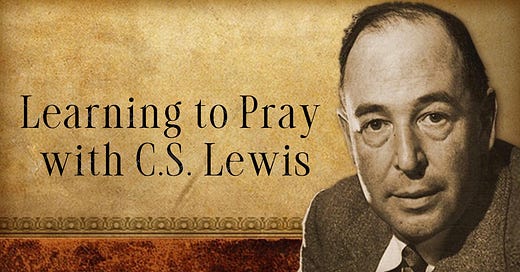Dear Friends,
Thank you for subscribing to my Substack newsletter - A Mere Christian On the Anglican Way. Over the past few weeks, I’ve been working on an Integrated Study Guide for a course that I am teaching at Trinity Anglican Seminary, where I serve as Dean & President. The course is titled “Learning to Pray with C.S. Lewis” and will be in a one-week intensive format, running from June 9th - June 13th 2025.
Several of you have alerted me to the fact that you will be enrolled in that course, and have already begun using the study guide. I’m writing to let you know that, although I’ve not published all of the study sessions here on Substack, the guide is now complete. The online component of the course will open (Canvas LMS) on April 17th, and if you are in the course, then you should definitely visit the course page and download all the documents you’ll need to get started. However, before you do that, you are welcome to access the study guide and the document that you will use to complete the study sessions at the links below:
If you have not planned to enroll in the course and happen to be in Ambridge, PA during the second week of June, it would be great to have you with us - auditors are most welcome. Unfortunately, there is no way to participate except in person.
You can find the syllabus here and a link to the application page here.
Course Description
In the early 1950's, C.S. Lewis suggested to several people, that he wanted to write a book on prayer. In a letter to an Italian priest, he wrote, "I am trying to write a book about private prayers for the use of the laity, especially for those who have been recently converted to the Christian Faith." Lewis wanted, especially, to deal with the problem of "petitionary prayer," and to answer the question: what does it mean to ask God to grant requests? The idea of petitionary prayer raises all kinds of questions about the nature of God and our relationship to him. To get at the issue, Lewis imagined a book, somewhat like Mere Christianity, which would address common misconceptions and make the faith more comprehensible for Christians.
Despite his best intentions, Lewis abandoned the project by at least 1954, since a clear way forward seemed beyond his reach. The philosophical and theological problems associated with prayer continued to vex him to such a degree that he turned from direct theological writing to fiction, where he could approach complex issues through more imaginative means, as he would go on to do in The Chronicles of Narnia. Still, the matter of prayer remained central in Lewis' thinking, and his final book, Letters to Malcolm: Chiefly on Prayer was his attempt to address the issue, though in a more indirect way than he had originally planned.
Fortunately, Lewis’s extensive writings on the Triune God and the Christian life provide rich insights into the nature and practice of Christian prayer and help us to imagine what the intended book might have contained. Accordingly, this course examines Lewis’s insights on prayer across a variety of his works - including Letters to Malcolm, Mere Christianity, The Abolition of Man, and a host of chapters and essays written during his long career - alongside biblical texts and the Book of Common Prayer, to reconstruct what his intended book on prayer might have revealed. Through careful study of Lewis's thought about God's nature, human identity, and divine-human communication, students will develop a deeper understanding of prayer as participation in the eternal dialogue of the Trinity. Prayer is – to put it simply – a restoration of the communicative dimension of our relationship with God. The course combines theological reflection with practical application, helping students grow both in their understanding and practice of prayer.
I’d be happy to answer any questions about this course and would love to see you with us in June, if possible.
Kind Regards,
Bryan Hollon
Monday of Holy Week, 2025




